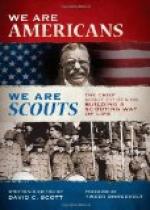He said the one who first fell sick died the same night their comrade left them to get help, and that the other one and himself were not strong enough to dig a grave to bury him in, so they left him just as he had died and crawled away, and they kept on together until near the next night, when the one that was with him took sick and could go no further.
“And,” said he, “I built a fire and we lay down, and I was so weak that I fell asleep and slept until morning, and when I awoke my companion was dead and cold. So I was all alone. I could do nothing for him any more than he and I could for the other one. I left him also and started on alone, but I could not go far, for I grew so weak. Then the thought came to me that I could eat my moccasins if I soaked them soft and broiled them over the coals. After I had eaten them, I was a little stronger and kept on until I reached this place, when my strength gave out again, and I built a fire, as I thought for the last time, for I did not expect to ever leave here. When you came, I heard your voice, but I thought I was dreaming.”
After I had listened to his sad story, I gave him some more to eat and more whiskey, which seemed to revive him, and he gained strength very fast, and when the morning came he could sit up and seemed quite composed, although he was no more than the shadow of a man. But by noon he could walk around and seemed very anxious to be moving. Late that afternoon I saddled the horses and assisted him to mount one of them, and we left the place. He said he had thought that place would be his last resting place.
We had ridden slowly for about five miles when we came to a stream of cool water, and where we could have a shady place to lie down and rest, and I made a camp there and spread a blanket for my sick man and prepared some supper for us both. I had to remind him many times to be careful and not eat too much in his weak state, for he was so hungry and the food tasted so good that he found it difficult to restrain himself from eating more than was good for him.
For two days it seemed almost impossible for him to get enough to eat, and although I pitied him, I knew I must not give him all he would have eaten.
The morning of the third day after I found him, he seemed more rational than he had since I had been with him. That morning he asked where we were going, and when I told him we were going to Bent’s Fort, where his comrade was waiting for us, he seemed surprised. He did not remember that I had told him how the herder at the Fort had found him, and that it was through his faithful struggle to get help for his starving friends that I had started out to find them. When I told it all to him again, he sat and cried like a child.
He said: “How can I ever pay this friend for suffering so much for me, and you, a stranger, for seeking to find me in the trackless wilderness?”
And then he told me what each of his comrades said before they died.




